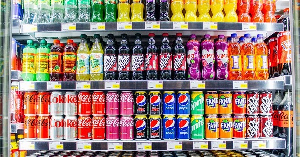The beverage industry is facing a severe threat from an influx of smuggled soft drinks, prompting urgent calls for government intervention.
The American Chamber of Commerce and the Spain-Ghana Chamber of Commerce have jointly issued a statement containing stark warning about the illegal importation of canned and PET (polyethylene terephthalate) packaged beverages into the country, citing grave concerns for both the economy and public health.
The illicit trade, which reportedly involves products from neighboring countries, is undermining legitimate manufacturers and depriving the government of crucial tax revenue.
This comes as revenue for that segment of the market is estimated to reach US$1.24 billion this year, according to data aggregator, Statista.
Of particular concern are Coca-Cola products, which the chambers claim are “among the most affected” by this smuggling operation.
Industry insiders reveal that these contraband beverages are often sold without the required tax stamps and at prices that significantly undercut the market, suggesting a sophisticated operation that bypasses customs duties, excise taxes, and other mandatory levies.
“This illegal activity threatens the survival of legitimate beverage manufacturers and undermines government revenue through taxation,” the chambers stated in their joint press release.
The economic impact extends beyond immediate financial losses, potentially discouraging future investment in Ghana’s manufacturing sector.
The crisis also raises alarming public health concerns. According to the chambers, these smuggled products circumvent established health and safety protocols, leaving consumers vulnerable to potential risks.
“The Food and Drugs Authority (FDA) cannot verify the quality of these beverages, as they bypass established health regulatory processes,” the statement warned.
Moreover, the reputation of authorised dealers and franchisees is at stake. The chambers noted that these legitimate businesses “suffer reputational damage when inferior products are passed off as their own in the market.”
The scale of the problem appears to be nationwide, with the Chambers calling for action in major urban centers including Accra, Kumasi, Tamale, and Takoradi.
This widespread distribution network suggests a well-organised smuggling operation that has managed to penetrate key markets across the country.
In response to this growing crisis, the chambers are calling for a multi-pronged approach involving several government agencies.
They have urged the Ghana Revenue Authority (GRA), particularly its Customs Division, to “take decisive action to halt the smuggling of these PET and canned beverages.”
The chambers are also seeking intervention from the Food and Drugs Authority, local authorities, and market leaders to protect brands and preserve government revenue.
Additionally, they have appealed to the Ministry of Trade and Industry, through the Ghana International Trade Commission (GITC), to address what they term as “unfair trade practices.”
This call to action underscores the complex nature of the problem, which straddles multiple jurisdictions and requires coordinated efforts across various government bodies.
“It is imperative that all stakeholders collaborate to combat this issue effectively,” the chambers emphasised.
In light of the African Continental Free Trade Area (AfCFTA) , analysts say the situation highlights the challenges facing Ghana’s efforts to foster a competitive business environment and protect its growing manufacturing sector.
Business News of Thursday, 19 September 2024
Source: thebftonline.com













